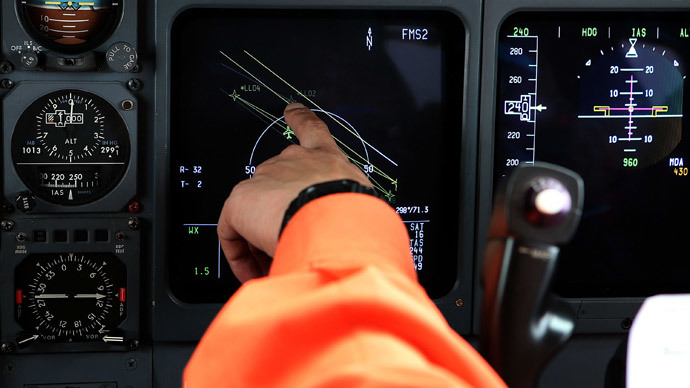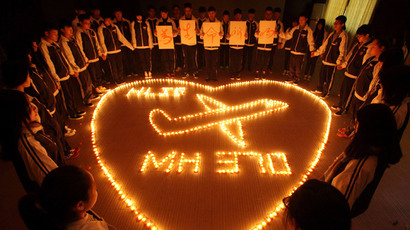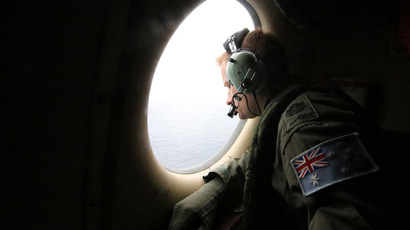Malaysia releases updated MH370 cockpit transcript, fueling speculation

A new version of the cockpit conversation that took place shortly before flight MH370 disappeared from radar over three weeks ago has stirred up fresh speculation over the fated liner as search efforts continue to turn up nothing.
The just-released transcript released by Malaysian officials shows the final sign-off between the pilots of flight MH370 that disappeared on March 8 with 239 people on board was "Goodnight Malaysian 370" and not "all right Goodnight" as was originally reported.
Malaysian officials had originally said the final sign off between the cockpit and traffic control had been given by co-pilot, Fariq Abdul Hamid, 27. However, officials are holding off an official statement on the identity of the speaker pending forensic examination of the recording.
This seemingly insignificant version of events, coming as it does more than three weeks after the flight went missing, has set off a storm of speculation as the physical hunt for the airliner continues to turn up no evidence of an airplane.
Pg 1-full transcript of comms between flight MH370 and Air Traffic Control Kuala Lumpur @HishammuddinH2O#MH370pic.twitter.com/acruTKLyW4
— H2O Comms (@H2OComms) April 1, 2014
The cockpit transcript, which involves just under one hour of seemingly routine conversation, was shared with families of the passengers and crew.
Air Traffic Control: "Malaysian Three Seven Zero contact Ho
Chi Minh 120 decimal 9, good night."
MH370: "Good night, Malaysian Three Seven Zero."
Pg 2- full transcript of comms between flight MH370 and Air Traffic Control Kuala Lumpur @HishammuddinH2O#MH370pic.twitter.com/tvmPrfiiux
— H2O Comms (@H2OComms) April 1, 2014
Malaysian authorities maintain there is nothing "abnormal" about the newly released cockpit communications.
Hishammuddin Hussein, Malaysia’s acting minister of transport who has become the official government spokesperson regarding the disappearance of MH370, remains convinced the aircraft disappeared after a deliberate act by someone on board. Questioned on his assumption in an interview with Chinese state broadcaster CCTV, Hussein said: "it seems that way."
"The four areas that the police are looking into: the possible terrorist angle, hijacking, personal problems or the psychological dimension of it. That is being shared by all intelligence agencies around the world."
Asked about the chance of survivors, Hishammuddin, who arrived in Hawaii on Tuesday to petition the US to intensify its efforts to find the missing plane, offered some hope: "miracles do happen," he said.
The latest news on the communications will only add to the mounting anger and frustration of the relatives of the missing passengers, the majority of whom are of Chinese descent, who have openly expressed their dissatisfaction with the Malaysian government and Malaysian Airlines’ handling of the situation.
Last week, Malaysian officials fueled the criticism when they revealed there was “sealed evidence” in regard to the missing flight that cannot be disclosed.
“The sealed evidence included air traffic control radio transcript, radar data and airport security recordings,” the Straits Times reported.
The hunt for MH370 continues
Search technicians from Malaysia, China and Australia are scheduled to brief skeptical relatives of the passengers on Wednesday in Kuala Lumpur.
"The experts will be able to explain the research, the data and the methodology that has informed the search operation," Hussein, the transport minister, said.
At the same time, Inmarsat, the British satellite firm that said the Malaysian Airlines flight ended in the southern Indian Ocean, told reporters it was not invited to take part in this briefing, or a briefing last week in Beijing where relatives expressed their anger at the company's analysis.
Malaysian officials claimed that British experts were requested
to attend the briefing but declined the invitation.
Chris McLaughlin, Inmarsat's vice-president for external affairs,
said this was an inaccurate description of events.
"It is no true that we refused to take part in a briefing last week,” he said in comments to the Guardian. “I assume that that was just a degree of confusion because it is very difficult thing that they [the Malaysian authorities] are doing. We hadn’t been invited."
Meanwhile, the monotonous and painstaking search effort over vast amounts of endless ocean, which is taking a physical toll on search teams, continues to turn up no sign of missing MH370.
Australia's Chief Marshal Angus Houston, the head of the search for the missing aircraft, has described the operation as the most challenging he has ever encountered, warning the operation "could drag on" for some time, according to the Australian Associated Press.
“What we really need now is to find debris, wreckage from the aircraft,” he said. “We've been searching for many, many days and so far have not found anything connected with MH370.”
Australian officials said on Tuesday that they had deployed an airborne traffic controller over the increasingly crowded Indian Ocean to prevent a mid-air collision among the many aircraft searching the area.
On Tuesday, 11 planes and nine ships were focusing on less than half of the search zone, some 120,000 square kilometers (46,000 square miles) about 2,000 kilometers (1,200 miles) west of Perth.
Meanwhile, searchers know too well that they are in a race against time to locate the flight recorder from MH370. Signals from the black box are expected to weaken by the end of this week, given that the batteries have enough energy to last 30 days.
An underwater submersible vehicle designed to track the pinging sound emitted by black boxes is expected to reach the search area on Thursday.














